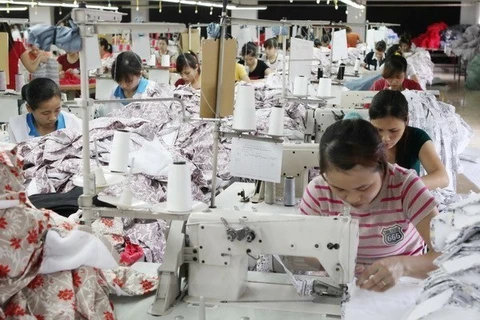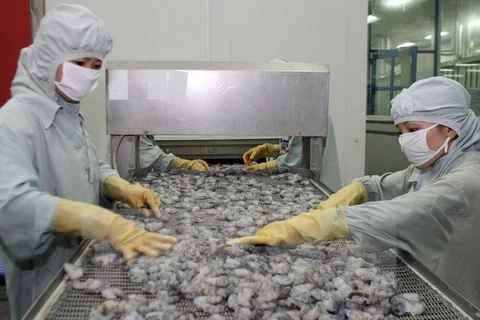 Chris Forbes, Canadian Deputy Minister of Agriculture and Agri-Food, speaks at the workshop (Photo: VNA)
Chris Forbes, Canadian Deputy Minister of Agriculture and Agri-Food, speaks at the workshop (Photo: VNA)HCM City (VNA) – A workshop was held in Ho Chi Minh City on February 28 to connect businesses that import soybeans from Canada.
Bui Tien Toan, sales manager of Linh Long Development Co., Ltd., said businesses now have multiple choices in importing soybeans, especially from the US and Canada.
The import is favourable as Canada’s soybeans meet his firm’s demand on quality and quantity, while the business can enjoy tariff incentives, he said.
He added that his company imports about 18,000-20,000 tonnes of soybean each year to distribute for domestic businesses to process food, including 6,000 tonnes imported from Canada.
Vo Thi Thuy Diem, sales manager of Golden Nutrition, said her company imports 500 tonnes of soybean per month, 30 percent of which are from Canada.
She said Vietbamese soybean importers need stable policies, as well as to promptly address relevant papers from Canadian exporters to maintain and develop the market.
Andrew Jones, a member of the Canadian soybean association Soy Canada, said that besides taking measures to increase soybean productivity and quality, the association is actively campaigning for new trade and market policies – especially for major destinations such as Japan, China, Malaysia, and Vietnam – to boost the development of Canada’s soybean sector.
Chris Forbes, Canadian Deputy Minister of Agriculture and Agri-Food, said Canada is implementing plant examinations for quality and origin certification so as to develop the soybean sector in a new direction, meeting the requirements of the export market.
Canada’s soybeans are sold in 71 countries, he said.
The Comprehensive and Progressive Agreement for Trans-Pacific Partnership (CPTPP) came into force in Canada from December 30, 2018 and Vietnam from January 14, 2019, which will contribute to promoting trade between the two countries, he said.
After the deal completes the tariff reduction roadmap, 94 percent of Canada’s agri-products and food will be at an advantage for exports to Vietnam, especially aquatic products, beef, fruit, wheat, soybean, and processed food.
According to the Soy Canada association, Vietnam was among the top 10 importers of the Canadian soybean industry in 2017, importing 123,000 tonnes of soybean worth 70 million CAD (53.1 million USD).
With its current trade promotion activities, Vietnam is likely to become one of the biggest soybean importers of Canada. –VNA
VNA






















